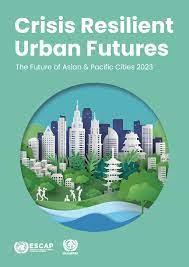
https://unescap.org/sites/default/d8files/event-documents/11th%20APFSD%2...
Registration To register for this side event, please use the following link: https://forms.gle/eRBVdqNCD5zs2uzH6
To attend the side event, all registrants must also register on Indico to attend the APFSD by February 6 using the link here: https://indico.un.org/event/1007683/ Please register using the option “Registration for Others” and choose your side event.
Those who do not register on Indico will not be able to access the United Nations Conference Centre. Background
To align with the themes of the 11th APFSD, this side event will challenge stakeholders to evaluate policies focused on urban regeneration for the provision of safe, resilient, and inclusive cities in the Asia Pacific region. Asia Pacific cities are imperfect, characterized by high rates of urbanization, uneven development, and intersecting challenges in climate, disaster, waste management, urban mobility, etc. However, our cities are in a state of regeneration, therefore smart planning policies can transform urban environments to improve quality of life for residents. Several regional cities have made the leap to become more sustainable through an urban regeneration approach, including advances in urban mobility, heritage preservation, and input from civil society.
Nevertheless, cities at differing levels of development can make improvements in their cities more quickly and effectively through best practice knowledge sharing. Key Questions and Outcomes This side event will proceed according to the following key guiding questions:
1. How can planners make cities more inclusive and resilient through urban regeneration?
2. What challenges do cities face when regenerating complicated, densely populated areas?
3. Why is it necessary to regenerate cities rather than rebuild them?
4. How can planners preserve urban heritage and communities when introducing changes through urban regeneration? This session will promote the sharing of best practices and call upon participants to evaluate common problems in Asia Pacific urban built environments through interactive polling.
The expected outcome is to identify recommended planning measures to regenerate cities in a way that will make them more resilient to disasters of all kinds, safer, and more inclusive for vulnerable members of society. The side event will help advance the following SDGs under review at the 11th APFSD: SDG 1 No Poverty as it relates to urban planning to build resilience to disasters for the poor and vulnerable, SDG 13 Climate Action to plan cities that are adapted for climate related disasters, SDG 16 Peace Justice and Strong Institutions to promote safer cities, and SDG 17 Partnerships for the Goals to promote smart policy through knowledge sharing and ICT tools









